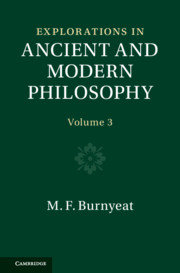Book contents
- Explorations in Ancient and Modern Philosophy
- Explorations in Ancient and Modern Philosophy
- Copyright page
- Contents
- Illustrations
- Preface
- Acknowledgements
- Abbreviations
- Introduction
- Part I The Republic
- Chapter 1 Plato on why mathematics is good for the soul
- Chapter 2 Long walk to wisdom
- Chapter 3 The truth of tripartition
- Chapter 4 Plato and the dairy-maids: the distribution of happiness inside and outside the ideal city of the Republic
- Chapter 5 Justice writ large and small in Republic IV
- Chapter 6 Fathers and sons in Plato’s Republic and Philebus
- Chapter 7 By the Dog
- Chapter 8 Culture and Society in Plato’s Republic
- Part II The past in the present
- Appendix: The archaeology of feeling
- Bibliography
- Index locorum
Chapter 5 - Justice writ large and small in Republic IV
from Part I - The Republic
Published online by Cambridge University Press: 24 March 2022
- Explorations in Ancient and Modern Philosophy
- Explorations in Ancient and Modern Philosophy
- Copyright page
- Contents
- Illustrations
- Preface
- Acknowledgements
- Abbreviations
- Introduction
- Part I The Republic
- Chapter 1 Plato on why mathematics is good for the soul
- Chapter 2 Long walk to wisdom
- Chapter 3 The truth of tripartition
- Chapter 4 Plato and the dairy-maids: the distribution of happiness inside and outside the ideal city of the Republic
- Chapter 5 Justice writ large and small in Republic IV
- Chapter 6 Fathers and sons in Plato’s Republic and Philebus
- Chapter 7 By the Dog
- Chapter 8 Culture and Society in Plato’s Republic
- Part II The past in the present
- Appendix: The archaeology of feeling
- Bibliography
- Index locorum
Summary
Plato’s treatment of justice in the individual in Book IV of the Republic has been heavily criticised. His radical proposal that it consists in an ordering of elements of the soul, parallel to justice in the city conceived as a social order maintained by specialisation of roles assigned to the three classes he specifies, is often seen as too remote from what anybody would recognise as ‘justice’. The criticism rests on two principal misconceptions: of the connection Plato is positing between psychic harmony and just behaviour, and of what he takes psychic harmony to consist in. First, he assumes law-abiding citizens behaving with what he like anybody else would count as justice. What harmony of the soul provides is the best explanation of their inner motivation for so behaving. Second, harmony is conceived as achieved when each element in the soul is focused as it should and will be, following good upbringing and education such as is described for the Guards in Books II and III.
- Type
- Chapter
- Information
- Explorations in Ancient and Modern Philosophy , pp. 119 - 137Publisher: Cambridge University PressPrint publication year: 2022

